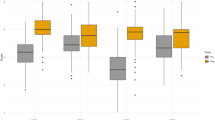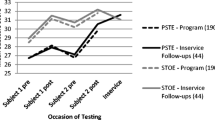Abstract
The purpose of this research was to enhance self-efficacy beliefs, chemistry content, and pedagogical content knowledge of middle grades teachers by incorporating specific design elements into professional development. This study analyzed the influence of program design on achieving gains in personal science teaching self-efficacy, outcome expectancy, chemistry content, and pedagogical content knowledge in 4 discrete cohorts (N = 135). Significant changes were produced in self-efficacy at .01 in each cohort, personal science teaching self-efficacy was significantly enhanced in Cohorts 1, 2, and 4 at .01, and outcome expectancy was significantly enhanced in Cohorts 1 and 3 at .01 and in Cohort 4 at .05. Professional development that enhances personal science teaching self-efficacy and outcome expectancy should be recognized as essential to achieving scientific literacy for all students.
Similar content being viewed by others
References
Armor, D., Conroy-Oseguera, P., Cox, M., King, N., McDonnell, L., Pascal, A., Pauley, E., & Zellman, G. (1976). Analysis of the school preferred reading pro-grams in selected Los Angeles minority schools (Report No. R-2007-LAUSD). Santa Monica, CA: Rand Corporation. (ERIC Document Reproduction Service No. 130 243)
Ashton, P., & Webb, R. (1994). Making a difference: Teachers' sense of efficacy and student achievement. New York: Longman.
Bandura, A. (1977). Self-efficacy: Toward a unifying theory of behavioral change. Psychological Review, 84, 191-215.
Bandura, A. (1986). Social foundations of thought and action: A social cognitive theory. Englewood Cliffs, NJ: Prentice-Hall.
Bandura, A. (1997). Self-efficacy: The exercise of control.New York: W. H. Freeman and Company.
Crowther, D., & Cannon, J. (2000, January). Professional development: What is working in the state of Nevada.Paper presented at the Annual International Conference of the Association for the Education of Teachers of Science, Akron, OH.
Enochs, L., & Riggs, I. (1990). Further development of an Elementary Science Teaching Efficacy Belief Instrument: A preservice elementary scale. School Science and Mathematics, 90, 694-706.
Enochs, L., Scharmann, L., & Riggs, I. (1995). The relationship of pupil control to pre-service elementary science teacher and outcome expectancy. Science Education, 79, 63-75.
Finson, K., Riggs, I., & Jesunathadas, J. (1999, January). The relationship of sci-ence teaching, self-efficacy, and outcome expectancy to the Draw-a-Science-Teacher-Teaching checklist.Paper presented at the Annual International Con-ference of the Association for the Education of Teachers of Science, Austin, TX.
Gibson, S., & Dembo, M. (1994). Teacher efficacy: A construct validation. Journal of Educational Psychology, 76, 569-582.
Guskey, T., & Passaro, P. (1994). Teacher efficacy: A study of construct dimensions. American Educational Research Journal, 31, 627-643.
Jabot, M. (2002, April). The effectiveness of a misconceptions-based approach to the teaching of elementary science methods. Paper presented at the International Conference of Pathways to Change, Arlington, VA.
Khourey-Bowers, C. (2004). Field ecology research: Merging professional devel-opment with student instruction. Manuscript in progress.
Lumpe, A., Haney, J., & Czerniak, C. (2000). Assessing teachers' beliefs about their science teaching context. Journal of Research in Science Teaching, 37, 275-292.
Ogle, D. (1986). K-W-L: Ateaching model that develops active reading of expository text. The Reading Teacher, 3, 564-570.
Posnaski, T. J. (2002). Professional development programs for elementary sci-ence teachers: An analysis of teacher self-efficacy beliefs and a profes-sional development model. Journal of Science Teacher Education, 13, 189-230.
Ramey-Gassert, L., Shroyer, M. G., & Staver, J. (1996). Aqualitative study of factors influencing science teaching self-efficacy of elementary level teachers. Science Education, 80, 283-315.
Riggs, I. (1995, April). The characteristics of high-and low-efficacy elementary teachers.Paper presented at the Annual Meeting of the National Association of Research in Science Teaching, San Francisco.
Riggs, I., & Enochs, L. (1990). Toward the development of an elementary teacher's science teaching efficacy belief instrument. Science Education, 74, 625-638.
Roberts, J. K., Henson, R., & Tharp, B. (2001). An examination of change in teacher self-efficacy beliefs in science education based on the duration of in-service activities. Journal of Science Teacher Education, 12, 199-231.
Rubeck, M. L. (1991). Path analytical models of variables that influence science and chemistry teaching self-efficacy and outcome expectancy in middle school science teachers. ProQuest Digital Dissertations, 52(02), 493.
Tschannen-Moran, M., Woolfolk-Hoy, A., & Hoy, W. K. (1998). Teacher efficacy: Its meaning and measure. Review of Educational Research, 68, 202-248.
Van Driel, J. H., Beijaard, D., & Verloop, N. (2002). Professional development and reform in science education: The role of teachers' practical knowledge. Journal of Research in Science Teaching, 38, 137-158.
Author information
Authors and Affiliations
About this article
Cite this article
Khourey-Bowers, C., Simonis, D.G. Longitudinal Study of Middle Grades Chemistry Professional Development: Enhancement of Personal Science Teaching Self-Efficacy and Outcome Expectancy. Journal of Science Teacher Education 15, 175–195 (2004). https://doi.org/10.1023/B:JSTE.0000047083.14197.b8
Issue Date:
DOI: https://doi.org/10.1023/B:JSTE.0000047083.14197.b8




